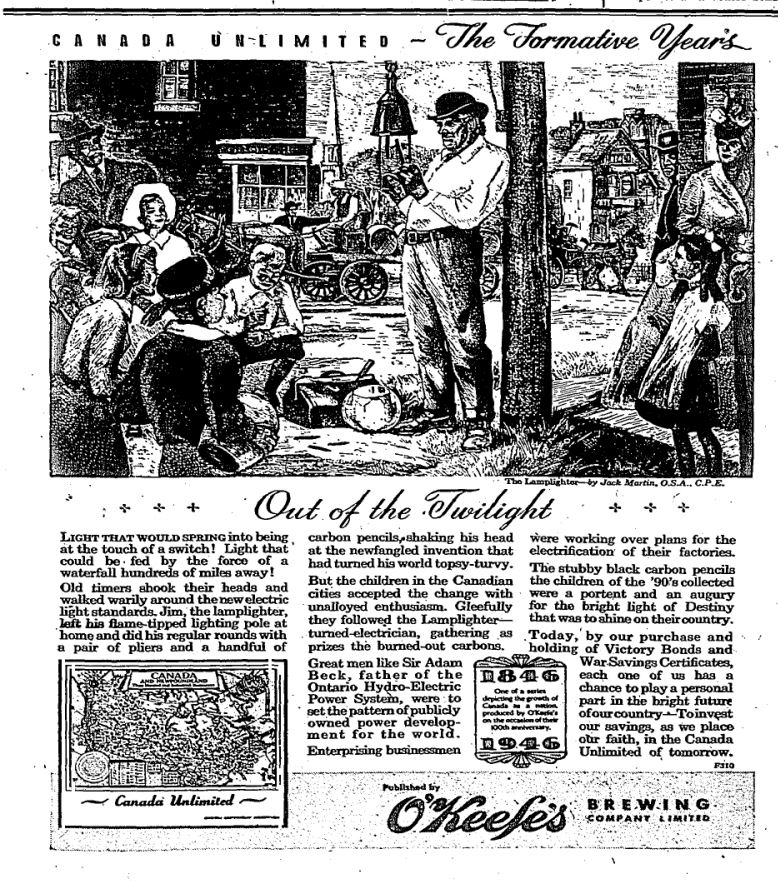The World I Entered – Part 5 – Maple syrup, Milk Pasturization, Agriculture, Needs in Europe, Rural Electrification
When I began this series of articles focused on newspaper clippings from the six months around the time of my birth, I didn’t appreciate how much insight I would gain into the challenges faced by my parents during this period and the environment that helped to shape the person I would become. I did not anticipate how much would be revealed in the pages of the Perth Courier, a local newspaper, and as a result, these posts are long. Dip into the detail, or scan quickly, according to your interest.
April 1946
Maple Syrup, Unpasteurized Milk, Future of Agriculture, Rural Electrification
Maple Syrup
Syrup season was always a big highlight of the year on our farm. In late winter the woodshed at the sap house was filled with wood, the sap pails were washed and checked for leaks and the spigots checked and sorted for tree taps. Gallon and quart metal tins were purchased at the Perth CO-OP, and can labels were ordered from the Perth Courier.
As the winter sun turned mellow Dad would use the horses to break trails in the bush and to ensure that any winter-fall trees were removed. A hand auger was used to create holes for the insertion of spigots. Later, metal sap buckets would be hung from the spigot hook.
Excitement ran free the day the evaporator was first fired up, and again when the first trickle of amber liquid flowed into the waiting cream can used to transport the syrup back to the house. Many long hours were spent tramping through snow or tending the boiling sap in the evaporator.
Apparently in 1946 the sap ran earlier in March and ended with a cold snap, only to begin again for a good run in April. I’ve been told that the week before my birth in March the roads were blocked with snow from a massive snow storm.

Syrup Season 1946
Warnings about Unpasteurized Milk
In spite of the earlier work of Adelaide Hoodless, who campaigned for family health through the pasturization of milk used for human consumption, many farm families continued to use strained, fresh milk for family consumption. In this post war era, warning were still being issued. This article was reposted in an April Perth Courier. It caught my eye because it foreshadowed events to have an impact on my life.

Warnings about the Use of Unpasteurized Milk
Plea for Agriculture – A Powerful Post War Editorial
This editorial by Mrs. C.A. Campbell really resonated with me.
Attitudes
Mrs. Campbell begins by talking about the rapid shift of focus from supporting the troops to feeding the world; from the watchword of ‘Victory’ to ‘Food’. Agriculture has replaced the troops in the front lines without the ‘glamour’ and support of the public offered during wartime.
In the postwar years, labour is demanding 40 hour weeks, while farmer’s who now average 56 years in age have been toiling 24/7 through the depression and war years.
Costs
Cost of production are up. Industry and other businesses function on a cost plus basis. The cheap food policies force farms into economic hardship as wartime subsidies are threatened.
Machinery needs repair, updating and replacement. Orders are stamped “This order accepted subject to price ruling at the time of shipment”. Farmers unwilling to commit to phases without a known cost. The federal government allows a price increase of 12 1/2%.
Labour
Lack of people willing to become farm labourers, inspite of high unemployment numbers, is a major problem on farms. Personnel and modern equment were priorities during the war years and needed to be priorities in the war against hunger.
Farm Reality
Farm families are facing a need to “start over” after the ravages of the depression and war years. Buildings needing repair, machinery needing replacement, money must be found for the education of children, preparation for old age and provision for possible sickness. The aging farm operators are physically and mentally exhausted. Many are talking of selling their farms or cutting production rather than continue their efforts to address national commitments.
No relief is in sight. And then the Ontario Minister of Agriculture states “There are too many farmer’s in Ontario”…

Agricultural Issues 1946
Needs in Europe

Wedding Rice
The pleas for assistance in Europe continue. Items of clothing, as well as food, are still desperately needed. People are encouraged to donate used clothing for shipment overseas.

Continued Need for Clothing in Europe
Extension of Electrical Power to Rural Communities
Major power lines had extended into rural communities before the war. Work to provide the branch lines required to supply electrical power to many rural locations had been halted during the war as materials and supplies became scarce. Glen Tay, once a major supplier of Hydro power for the town of Perth, and Tayside Farms, waited until 1948 for this service.

Electrification of Rural Ontario

Rural Hydro Service Message June 1946
